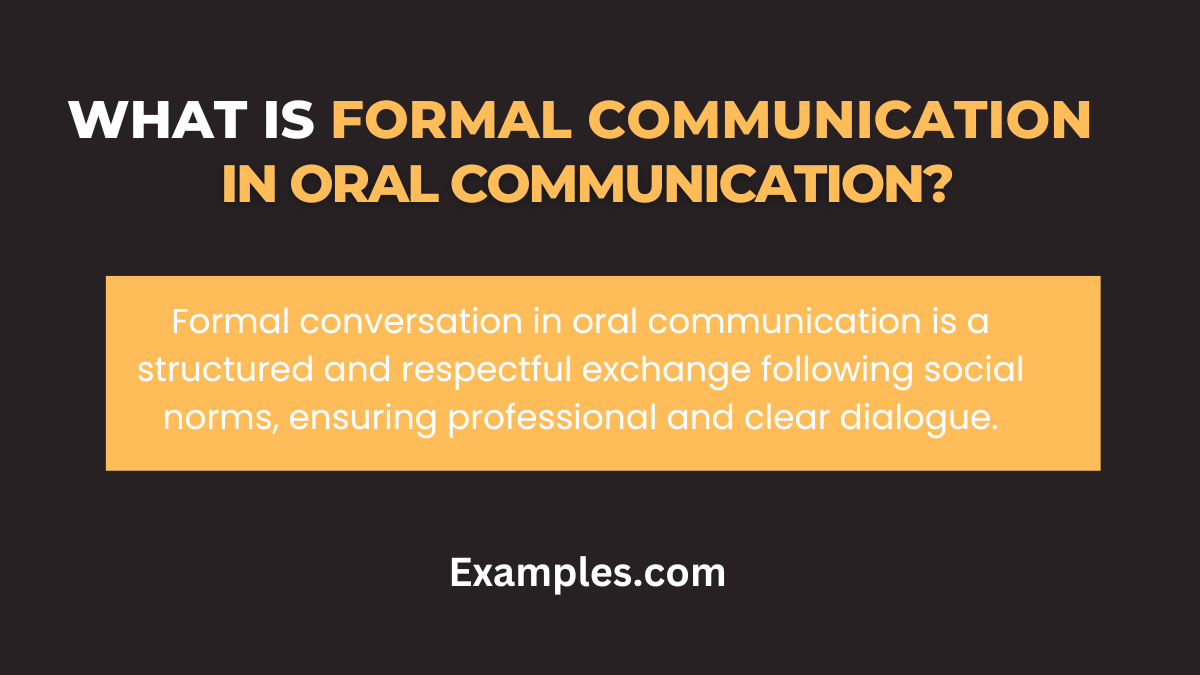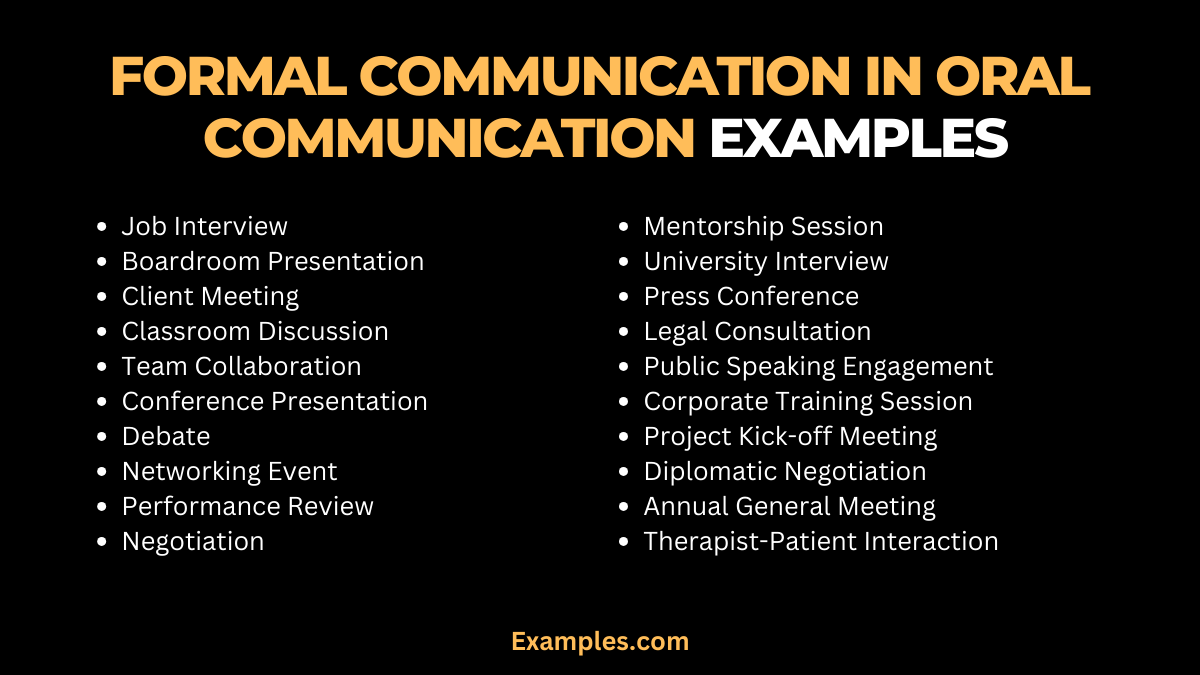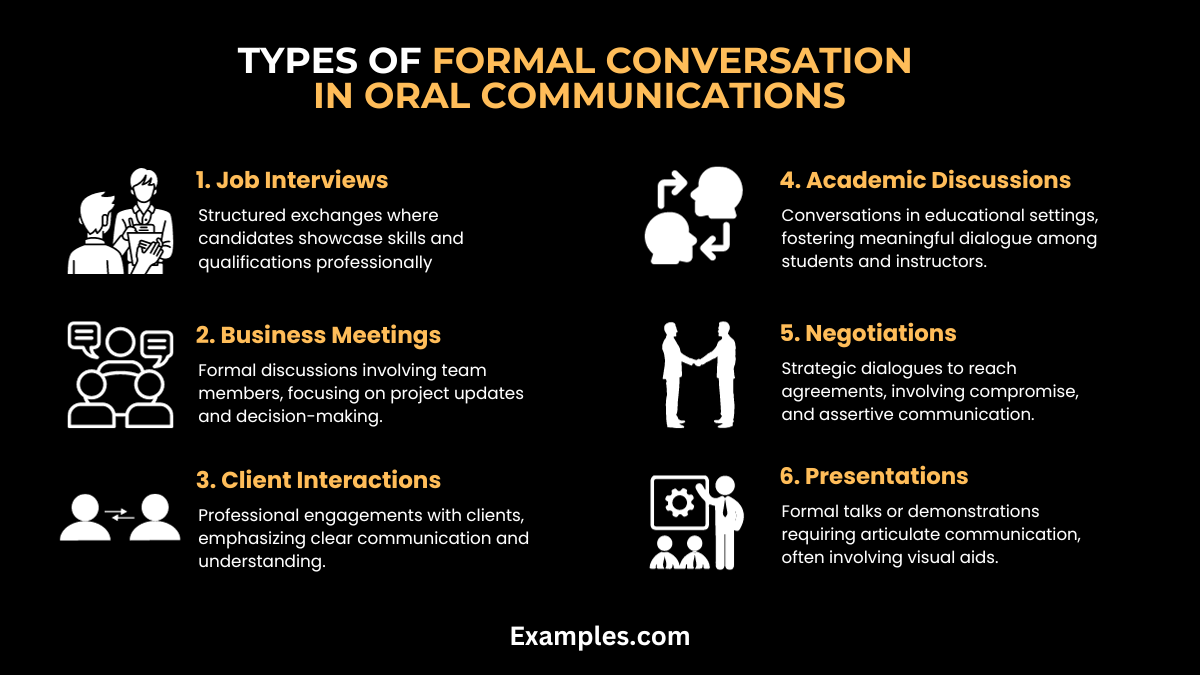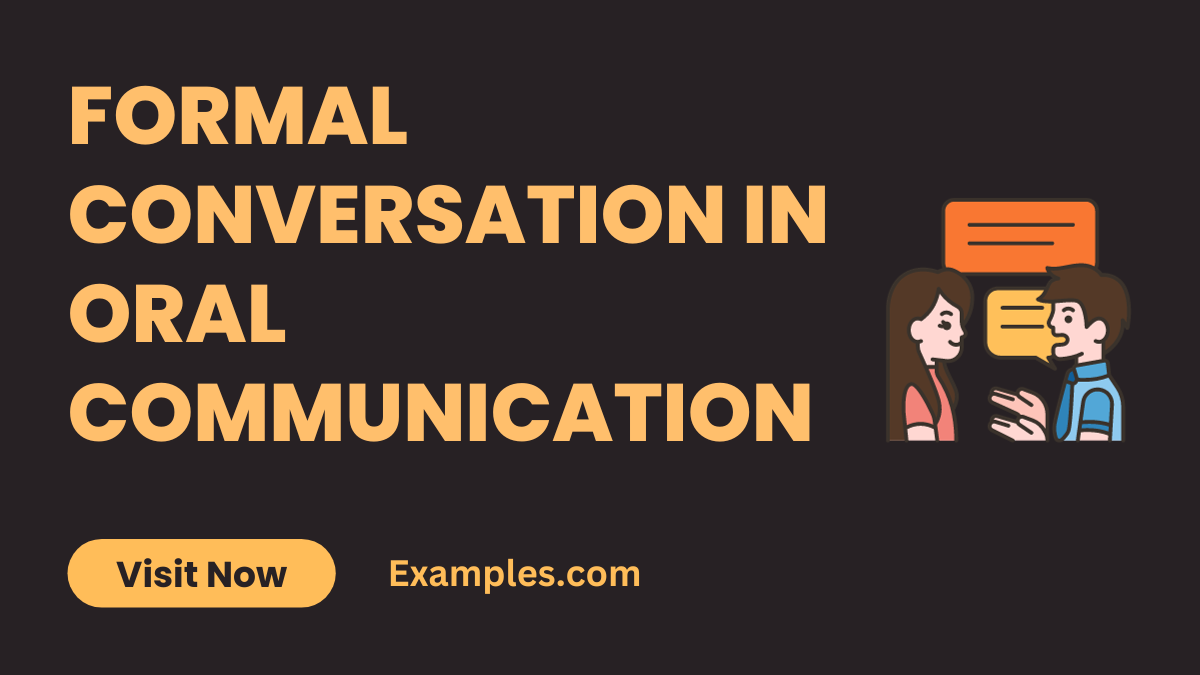29+ Formal conversation in Oral Communication Examples
Unlock the power of formal conversation in oral communication with our comprehensive guide. Dive into clear definitions, insightful examples, and effective tips to elevate your communication skills. Whether you’re navigating workplace dialogues or engaging in academic discussions, our guide is your key to mastering the art of articulate and respectful oral expression. Explore communication examples that illuminate the nuances of formal conversations and enhance your overall communication proficiency.
What is Formal Conversation in Oral Communication?

In simple terms, formal conversation in oral communication refers to structured and respectful exchanges adhering to social norms. This type of dialogue follows professional etiquette, maintaining a refined tone and clear conveyance of thoughts. It involves the use of effective communication skills, ensuring clarity and fostering a positive and respectful atmosphere.
30 Formal Conversation in Oral Communication Examples

Unleash the potential of formal conversations in oral communication with our curated guide. Explore 30 diverse examples illustrating the art of structured and respectful dialogue. From workplace scenarios to academic discussions, master the nuances of effective communication for success in various domains. Enhance your skills with real-world examples, each accompanied by concise explanations to help you grasp the essence of formal conversation effortlessly.
- Job Interview: Navigate professional interviews with confidence and articulate responses.
- Boardroom Presentation: Conduct impactful presentations with clear communication and persuasive language.
- Client Meeting: Foster positive client relationships through formal and client-focused conversations.
- Classroom Discussion: Engage in academic discourse with peers and instructors, showcasing depth of understanding.
- Team Collaboration: Collaborate effectively by articulating ideas clearly in group discussions.
- Conference Presentation: Establish thought leadership by delivering a formal talk with expertise and clarity.
- Debate: Participate in debates, presenting arguments persuasively and respectfully.
- Networking Event: Build professional connections through meaningful and formal conversations.
- Performance Review: Navigate performance evaluations with poise, addressing feedback and goals.
- Negotiation: Achieve successful outcomes by negotiating with clarity and assertiveness.
- Mentorship Session: Convey aspirations and seek guidance through respectful mentorship conversations.
- University Interview: Secure admissions by showcasing your skills and qualifications articulately.
- Press Conference: Handle media inquiries with professionalism, ensuring clear and accurate communication.
- Legal Consultation: Navigate legal discussions with precision and articulate argumentation.
- Public Speaking Engagement: Inspire audiences through articulate speeches, combining clarity and passion.
- Corporate Training Session: Facilitate learning through structured and engaging formal communication.
- Project Kick-off Meeting: Initiate projects effectively by clearly communicating goals and expectations.
- Diplomatic Negotiation: Handle diplomatic discussions with tact and strategic communication.
- Annual General Meeting: Lead AGMs with clarity, addressing stakeholders and presenting reports.
- Therapist-Patient Interaction: Conduct therapeutic conversations with empathy and active listening.
- International Business Discussion: Navigate cross-cultural conversations by adapting communication styles.
- Scientific Research Presentation: Present research findings formally, simplifying complex information for diverse audiences.
- Human Resources Interview: Conduct HR interviews with professionalism and adherence to policies.
- Government Policy Briefing: Communicate policy implications clearly in formal government discussions.
- Press Interview: Handle media interviews, ensuring key messages are communicated effectively.
- Customer Support Call: Resolve customer issues with clarity and effective problem-solving.
- Wedding Toast: Craft heartfelt and formal toasts, celebrating special occasions eloquently.
- Executive Board Meeting: Lead executive discussions with strategic communication and decision-making.
- Community Town Hall Meeting: Address community concerns formally, fostering transparency and collaboration.
- Virtual Team Meeting: Lead remote teams with clear and structured virtual communication.
Formal Conversation in Oral Communication Examples for Students
Unlock the art of formal conversation for students with clear, respectful exchanges. Learn by example with scenarios like classroom discussions, where articulating thoughts and engaging peers foster a positive learning environment. Demonstrating effective communication skills in educational settings prepares students for success in both academic and professional realms.
- Class Presentation: Excel in class presentations by organizing thoughts coherently and addressing queries confidently.
- Group Project Meeting: Collaborate effectively on group projects, ensuring each member’s ideas are expressed and understood.
- Office Hours Discussion: Utilize office hours to seek clarifications from instructors, demonstrating proactive engagement.
- College Admissions Interview: Ace admissions interviews by showcasing achievements and goals with eloquence.
- Internship Application Call: Communicate professionalism during internship calls, expressing interest and qualifications.
- Extracurricular Club Planning: Lead club discussions with clarity, encouraging active participation and idea sharing.
- Study Group Conversation: Contribute meaningfully to study group discussions, facilitating collective understanding.
- Academic Conference Participation: Engage in academic conferences with articulate questions and insightful contributions.
- Peer Review Feedback: Provide constructive peer feedback, emphasizing clarity and sensitivity in communication.
- Career Counseling Session: Navigate career counseling sessions by articulating goals and seeking guidance effectively.
Formal Conversation in Oral Communication Examples at the Workplace
Master workplace communication with formal conversations that enhance collaboration and productivity. From client meetings to project updates, effective communication fosters a positive and professional work environment. Learn to navigate various scenarios by example, ensuring success in diverse corporate settings.
- Team Briefing: Conduct team briefings by delivering concise and clear updates, fostering team alignment.
- Performance Appraisal Discussion: Navigate performance appraisals with professionalism, addressing goals and areas for improvement.
- Client Proposal Presentation: Present client proposals persuasively, emphasizing the benefits and value of the offerings.
- Job Interview Panel: Participate in job interview panels by asking relevant questions and evaluating candidates objectively.
- Conflict Resolution Meeting: Resolve workplace conflicts formally, emphasizing active listening and finding common ground.
- Managerial Delegation: Delegate tasks effectively by communicating expectations clearly and providing necessary information.
- Cross-Departmental Collaboration: Facilitate collaboration across departments, ensuring smooth information exchange and project alignment.
- Board of Directors Meeting: Lead board meetings with strategic communication, addressing key issues and decisions.
- Employee Training Session: Conduct training sessions with clarity, ensuring employees comprehend and apply new information.
- Client Feedback Discussion: Discuss client feedback formally, addressing concerns and strategizing improvements proactively.
Formal Conversation in Oral Communication Examples in Movies
Explore the cinematic world to understand how formal conversations unfold in various scenarios. From courtroom dramas to diplomatic negotiations, movies offer insights into effective communication strategies. Learn by example how actors articulate thoughts, convey emotions, and engage in formal dialogues, adding depth to their characters.
- Legal Argument in Court: Witness compelling legal arguments in movies, where lawyers articulate cases persuasively.
- Diplomatic Negotiations: Observe diplomatic negotiations on-screen, highlighting the nuances of international communication.
- Corporate Boardroom Scenes: Movies often depict impactful boardroom discussions, showcasing strategic communication and decision-making.
- Press Conference Dynamics: Explore how characters handle media inquiries in press conference scenes, managing information flow.
- Job Interview Portrayals: Movies provide diverse portrayals of job interviews, offering insights into effective self-presentation.
- Family Meeting Conversations: Witness family discussions in movies, showcasing interpersonal communication and conflict resolution.
- Political Debate Scenes: Movies feature intense political debates, demonstrating the power of persuasive communication in public forums.
- Educational Classroom Dialogues: Observe classroom scenes for depictions of student-teacher interactions, emphasizing effective learning communication.
- Scientific Discovery Announcements: Explore movies portraying scientific breakthroughs, where characters communicate findings with excitement and clarity.
- Historical Negotiation Sequences: Movies often recreate historical negotiations, offering insights into formal communication strategies in pivotal moments.
Types of Formal Conversation in Oral Communications

Understanding the various types of formal conversation in oral communication is crucial for effective interpersonal dynamics. Here’s a comprehensive guide, presented in a table with eight distinct categories:
| Type | Description |
|---|---|
| Job Interviews | Structured exchanges where candidates showcase skills and qualifications professionally. |
| Business Meetings | Formal discussions involving team members, focusing on project updates and decision-making. |
| Client Interactions | Professional engagements with clients, emphasizing clear communication and understanding. |
| Academic Discussions | Conversations in educational settings, fostering meaningful dialogue among students and instructors. |
| Negotiations | Strategic dialogues to reach agreements, involving compromise, and assertive communication. |
| Presentations | Formal talks or demonstrations requiring articulate communication, often involving visual aids. |
| Performance Reviews | Structured assessments of an individual’s work, focusing on achievements and areas for improvement. |
| Public Speaking Engagements | Addressing an audience formally, conveying information with clarity and impactful expression. |
What Must Be Avoided in Formal Conversation in Oral Communication?
While engaging in formal conversations, certain pitfalls must be avoided to maintain professionalism and ensure effective communication. Here are key aspects to steer clear of:
- Avoid Ambiguity: Ambiguous language can lead to misunderstandings. Be precise and use clear, unambiguous terms to convey your message accurately.
- Minimize Jargon: Excessive use of industry-specific jargon may alienate those not familiar with the terminology. Strive for clarity and choose language that is accessible to all participants.
- Steer Clear of Interrupting: Interrupting someone during a formal conversation is disrespectful. Practice active listening and allow others to express their thoughts before responding.
- Refrain from Emotional Outbursts: Emotional outbursts, whether frustration or anger, can undermine the professionalism of a conversation. Maintain composure and address emotions constructively.
- Avoid Monotone Delivery: A monotone voice can make formal conversations dull and less engaging. Incorporate vocal variety to keep listeners attentive and interested.
- Limit Distractions: In formal settings, distractions like phones or side conversations should be minimized. Focus on the conversation at hand to ensure understanding and respect.
- Don’t Overuse Fillers: Excessive use of fillers such as “um” and “uh” can detract from your message. Practice pausing instead, allowing for a more composed and articulate delivery.
- Steer Clear of Over-Talking: Dominating a conversation hinders effective communication. Encourage a balanced exchange of ideas by allowing others ample opportunity to speak.
Tips for Effective Formal Conversation in Oral Communications
Mastering the art of effective formal conversation is essential for personal and professional success. Here are practical tips to enhance your oral communication skills:
- Active Listening: Actively listen to others, demonstrating genuine interest and understanding of their perspectives.
- Clarity in Expression: Clearly articulate your thoughts, using language appropriate for the audience to ensure understanding.
- Body Language Awareness: Pay attention to your body language, maintaining open and confident postures to convey professionalism.
- Prepare and Plan: Adequate preparation ensures you convey your message coherently. Plan your key points and anticipate potential questions.
- Tailor Your Communication: Adapt your communication style to the audience, considering factors like their familiarity with the topic and level of formality required.
- Encourage Feedback: Foster a culture of feedback to continuously improve your communication skills. Constructive criticism is invaluable for growth.
- Maintain a Professional Tone: Even in casual settings, maintain a professional tone to uphold respect and convey seriousness about the conversation.
- Time Management: Be mindful of time constraints, ensuring that your communication is concise and to the point.
To effectively conclude the discussion on formal conversation in oral communication, it’s important to recognize the broad applications and significance of this skill. Formal conversation plays a crucial role in various professional and academic settings, enabling clear, respectful, and efficient communication. It is essential for job interviews, business meetings, academic discourse, and even diplomatic negotiations. Mastering this form of communication not only enhances professional interactions but also contributes to personal development and confidence in various social contexts.
For those looking to further develop their skills in formal conversation, exploring additional educational resources is highly beneficial. The University of Oxford offers an extensive range of courses and materials on communication skills, including formal conversation techniques. Their programs provide a blend of theoretical knowledge and practical application, making them ideal for individuals aiming to improve their professional communication. You can find more about their courses at University of Oxford.
Another valuable resource is the MIT OpenCourseWare platform, which provides free access to a wide range of courses, including those focused on effective communication. These courses, developed by one of the leading educational institutions in the world, offer in-depth insights and practical strategies for enhancing formal communication skills. Explore their offerings at MIT OpenCourseWare.
By leveraging these resources and continuously practicing formal conversation techniques, individuals can significantly improve their communication effectiveness, benefiting both their professional and personal lives.



